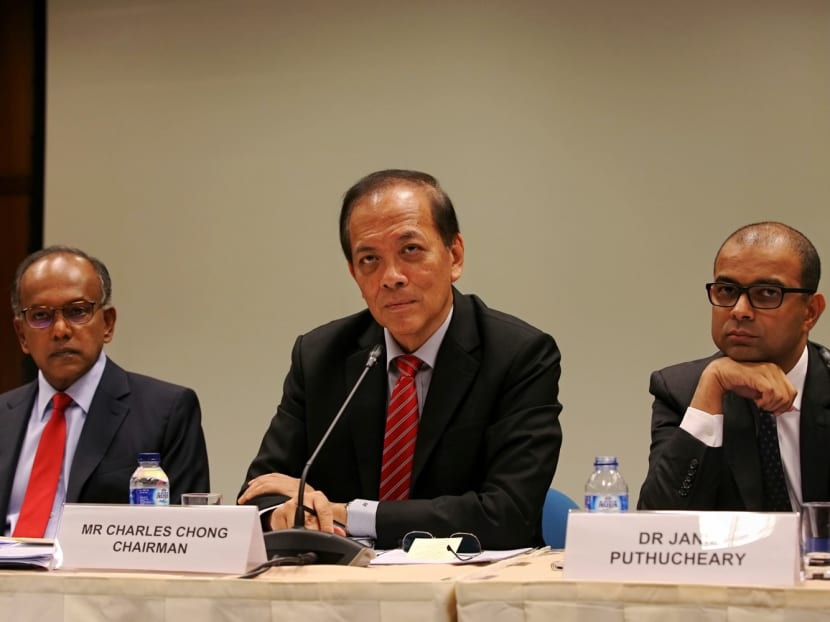No weight given to historian Thum Ping Tjin’s views and he 'clearly lied' about credentials, says committee
SINGAPORE — Singling out Singaporean historian Thum Ping Tjin as not a “credible representor”, the committee studying online falsehoods said it gave “no weight” to his views in its report released on Thursday (Sept 20).

The 10-member committee, chaired by Deputy Speaker of Parliament Charles Chong, charged that not only did the Dr Thum Ping Tjin lie about his academic credentials, but also that he is not a credible historian.
SINGAPORE — Singling out Singaporean historian Thum Ping Tjin as not a “credible representor”, the committee studying online falsehoods said it gave “no weight” to his views in its report released on Thursday (Sept 20).
The 10-member committee, chaired by Deputy Speaker of Parliament Charles Chong, charged that not only did the Oxford-trained historian lie about his academic credentials, but also that he is not a credible historian due to the way he picked and chose historical evidence to support his thesis and disregarded contradictory evidence without providing adequate reason. He also failed to submit sufficient documents to substantiate his claims.
One of 65 individuals and organisations called by the committee to give oral evidence under oath in March, Dr Thum had claimed that historically, there has only been one body that has peddled falsehoods — the People’s Action Party (PAP) Government.
He alleged that it has been spreading “fake news” about Operation Coldstore, for example, “for narrow party-political gain”. The 1963 internal security operation saw more than 100 alleged leftist leaders and trade unionists arrested and detained.
ArrayDuring a marathon public hearing in March which lasted for almost six hours, Dr Thum and Law and Home Affairs Minister K Shanmugam — a committee member — had crossed swords over his submission and his academic credentials.
Subsequently, Dr Thum publicly questioned the motive behind Mr Shanmugam’s “grilling”, and alleged that his experience would “intimidate and instill fear into anyone who contradicts the official government narrative”. He also claimed that academic freedom and inquiry were suppressed in Singapore.
In its 273-page report outlining 22-wide ranging proposals to combat the problem of fake news, however, the committee took pains to lay out its reasons for dismissing his submission.
TODAY has reached out to Dr Thum for his response.
Separately, the committee’s report also mentioned two parties — non-governmental organisations Human Rights Watch and Reporters Without Borders — that were invited to give evidence, but failed to turn up. Laying out the exchanges with them in the addendum, the committee noted that the “excuses” given by both parties for not turning up for the hearings were “contrived”.
LIED ABOUT HIS ACADEMIC CREDENTIALS
-
Dr Thum had “misrepresented” his academic credentials, suggesting that he held “more distinguished roles” at Oxford University, said the Select Committee in its report.
-
He provided several different descriptions of his position: “a Research Fellow in History… at the University of Oxford (2014-present)”, a “visiting professorship in anthropology” and a “visiting research fellow in history within the department of anthropology”.
-
But the committee said Oxford University confirmed that Dr Thum “was not, and never was, an employee of Oxford University”. He was “a Visiting Fellow with the Fertility and Reproduction Studies Group in the School of Anthropology” and formerly a “Visiting Scholar (not a Research Fellow) at the Oxford Centre for Global History”. Both are unpaid positions.
-
He had various visiting scholar arrangements with Oxford University, which gave him certain privileges in return for him paying a fee to the university. The Select Committee reiterated: “His claim that his repeated misrepresentations were unintentional is not believable. He has clearly lied,”
DOUBTS ON CREDIBILITY AS HISTORIAN
-
Despite his thesis that Operation Coldstore was politically motivated and had no national security basis, the committee noted that Dr Thum admitted not to have read or chose not to give any weight to accounts by senior cadres of the Communist Party of Malaya (CPM), including its secretary-general Chin Peng, who stated in his memoirs that he tried to get the underground communist movement to cause a split in the PAP.
-
Apart from acknowledging that the accounts contradicted his thesis, Dr Thum also did not explain why he chose to disregard them.
-
Dr Thum also failed to submit additional documents to “substantiate his claim that he had indirectly dealt with contradictory evidence in his publications, a claim significant to his credibility as a historian”, the Select Committee said.
OTHER EVENTS
-
An open letter addressed to the committee chair in support of academic freedom and Dr Thum was circulated online in April. More than 130 academics from different countries signed it. They had also questioned Mr Shanmugam’s treatment of Dr Thum.
-
Trustees of Project Southeast Asia subsequently released a statement on their website in support of Dr Thum, who was a coordinator and trustee of the organisation.
-
Three Oxford academics — two of whom were Dr Thum’s joint doctoral supervisors — also defended their former student’s doctoral thesis and academic credentials as a historian.
-
Committee chair Mr Chong replied publicly that while Dr Thum is entitled to his views, he must expect to be questioned about them when he puts forth his views before a Select Committee.
-
The committee also found that both the open letter and statement by the trustees of Project Southeast Asia, “which cast aspersions on the Committee’s process, were based on wrong facts and premises”.
-
It also noted that both documents “had been circulated internationally”, with the Project Southeast Asia statement having “arisen from active lobbying” by Dr Thum’s business partner and fellow activist, Dr Philip Kreager. Dr Thum himself had also been closely involved in the process, the committee had said.
Sign up for TODAY's WhatsApp service. Click here:









